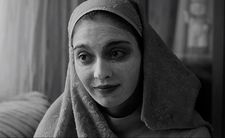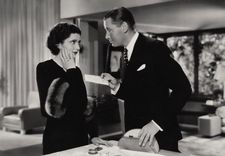 |
| Director/screenwriter Amalia Ulman as Leo with her mother Maria (Ale Ulman) in El Planeta: “I feel the relationships with the men were important to point to the desperation of these women.” |
El Planeta director/screenwriter/star Amalia Ulman received two Gotham Award nominations (Best Screenplay and Breakthrough Performer) on Thursday morning. Her film was the Opening Night selection for the 50th anniversary of New Directors/New Films, hosted by Film at Lincoln Center and the Museum of Modern Art in April of this year.
Amalia Ulman discusses the three unwise men, working with the editors Katie Mcquerrey (Matthew Barney’s River Of Fundament, Redoubt, and longtime Coen brothers supervising editor) and Anthony Valdez, a waiting room encounter with overheard conversations inspired by Katsuhito Ishii’s The Taste of Tea, The Nutcracker and Chinese towels, Milos Forman's Amadeus, and another Ernst Lubitsch connection in the second installment of our conversation.
 |
| Man in café (Nacho Vigalondo) propositions Leo (Amalia Ulman): “I didn’t realise to what extent all the men in the movie were terrible until other people told me.” |
Amalia Ulman is great at setting a mood which almost imperceptibly transforms during each scene, a bit like a sweater that you didn’t notice you were wearing inside-out. Leo (Amalia Ulman) and her mother Maria (Ale Ulman) face eviction. Maria, wearing a fur coat, carrying two big boxes, walks along Gijon’s harbor promenade in the rain. From this slightly dreamy start of El Planeta, the following encounter between Leo and a man (Nacho Vigalondo) in a café shakes us wide-awake.
With jump cuts, fancy fades, and towels featuring cartoon owls and penguins, Ulman draws from her work as an artist and includes it seamlessly into the world of cinema.
From New York City before her New Directors/New Films premiere, Amalia Ulman joined me on Zoom for an in-depth conversation on El Planeta.
Anne-Katrin Titze: There are three encounters with men in your film and all of them are not exactly perfect. The first one, I am sure, surprises people watching. I am not going to go into detail to spoil anything. The second one is the fashion editor [Saoirse Bertram] and again you don’t know where the conversation will go. With the third one, Amadeus [Zhou Chen], the surprise comes at the very end. There is a piece of dialogue taken from Herbert Marshall and Kay Francis in Trouble in Paradise; you take the cheerful Lubitsch scenario and add your own two, very different lines. How did you structure the film with these three men?
 |
| Amadeus (Zhou Chen) with Leo (Amalia Ulman): “I thought it was a kind of funny name that I’ve encountered in China before. I left a lot of little film clues around.” |
Amalia Ulman: This is kind of unprofessional, but I didn’t realise to what extent all the men in the movie were terrible until other people told me. Actually, the biggest collaborators in the film and the people who supported me the most were men. But yeah, it’s funny how every encounter with men, it’s negative. I think it’s because the point of connection is out of their desperation. So that’s what makes it already bad. Everything is about expecting something back. Definitely the first one is a bad encounter because he’s a man from the internet, looking for sex [played by Nacho Vigalondo].
With Amadeus, I feel like the problem is with the transactional element that Leo expects because she is daydreaming about going back to London. If she had been more financially independent or had her thing sorted, it wouldn’t be a big deal for her to be a one night stand. But because she had her head full of ideas, I feel that’s why the heartbreak comes in because it’s not just romantic but “I need to get out of here!”
I feel the relationships with the men were important to point to the desperation of these women. They don’t have anything else left except their own bodies. The only thing they can do is reenact with their own bodies to plan a way out. Like her mom pretending to be wealthy to eat for free and the daughter making connections to her old life, trying to network. I like that the men, with the exception of Amadeus, have no names.
 |
| On Maria (Ale Ulman) and Leo (Amalia Ulman): “Her mom pretending to be wealthy to eat for free and the daughter making connections to her old life, trying to network.” |
AKT: And the choice of the name Amadeus. Of course if the men had names they would have spells put on them [the mother in the film casts spells by putting names on pieces of paper to be put in water glasses or the freezer].
AU: Yeah, totally. And Amadeus is a reference to Milos Forman because I love the movie Amadeus and I thought it was a kind of funny name that I’ve encountered in China before. I left a lot of little film clues around.
AKT: And the quote from the Lubitsch film?
AU: Yes, “It could have been marvelous!”
AKT: “Divine” and goodbye. It’s interesting how you are updating. In the Lubitsch films there are lots of desperate characters, too. People try to trick each other and there is a lot of charm but we live in a different world where certain charms don’t work anymore. Some of the men on the street you expect to stop and help Maria, for instance. And “I’ll send you flats” is not really what Leo wants to hear after the divine quote. An interesting moment is at the doctor’s office, you leave a lot for us to fill in. Is it an abortion?
AU: It’s too soon to be an abortion. But it’s definitely a Planned Parenthood, sexual aid clinic. We don’t know if it’s an STD or the morning-after pill, which is very common when girls haven’t used a condom and aren’t sure sometimes. That’s not my common practice but I have friends and sometimes they were like too drunk or they got too comfortable and they don’t know and they go and get the morning-after pill. Or to get tested. That’s also the burden of being a woman, having to do that afterwards.
 |
| Amalia Ulman on Leo: “She had her head full of ideas …” |
It’s kind of explained afterwards when she is saying “my skin is going to be a little bad,” which hints at some medicine she is taking, hormonal or other. Yeah, it’s ambiguous. The inspiration for that scene comes from this Japanese movie that I really love, The Taste of Tea. There is this scene where the teenager is having lunch by himself and next to him, there’s a really awkward couple talking about her very imminent boob job. They are really bizarre characters and he is just listening to this conversation. So that was the inspiration, to just sit there and listen to this outrageous conversation.
AKT: And we listen with Leo and forget for the time being to wonder why she is there. I was actually thinking of Hemingway’s Hills Like White Elephants. That’s why I thought of abortion, which in the short story is never mentioned. Beautiful use of The Nutcracker! It’s needed at that moment. Together with the shot of the dish towels with a penguin and an owl, I read it as a link to childhood and a longing for better times. For when the world was easy.
AU: Yes, childhood and also silliness. In my work as an artist I’ve done a lot of work with the design in Chinese imports, things like that, and the language used. It’s always very silly and hopeful and childish. I like that contrast between this very stupid item and everything they are going through. To have this back and forth of the stressful situation and the terrible things they are going through and then these silly, silly towels from a Chinese store. This contrast I thought was very necessary also to break from the dramatic charge. The whole movie kind of compensates the silliness of the characters with what they have going on.
 |
| Mariette Colet (Kay Francis) to Gaston Monescu (Herbert Marshall) in Ernst Lubitsch’s Trouble In Paradise: “Divine” |
AKT: Another connection with Grey Gardens. You had two editors, one of them worked on Matthew Barney’s films.
AU: Yes, she’s worked on the Coen brothers films and a few art films like with him. It was really great that she had a knowledge of art film and the film world. In the end everything happened very nicely and fast to meet these two editors, but for a while it was very stressful because I needed to find an editor in New York that spoke Spanish. One of the editors is more from the art world and I already knew him and then Katie was introduced to us by another person and she spoke Spanish, which was a surprise. It made her perfect because you need to understand at least a little bit of the movie to edit it well. They were an amazing team, both of them.
AKT: You included these fancy fades.
AU: Those come from my work as an artist. In my practice as an artist I do a lot of video work and I thought it was silly to not maintain some of my language as an artist into the film because I still see film as an artwork in a way. I didn’t want to compartmentalise. It should all be the same, especially when I’ve worked with the language of video for so long. So that was like a little reference to my practice. But they were very welcoming with me being weird with the transitions.
Read what Amalia Ulman had to say on cleverly used references to Martin Scorsese, David and Albert Maysles’ Grey Gardens, and Jean Renoir’s Rules Of The Game entering the picture.
The Gotham Awards will take place on November 29 at Cipriani Wall Street.





















